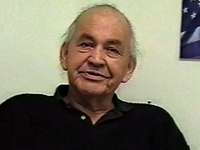| Lewis Sawaquat |

Lewis Sawaquat [2006] | Korean War, 1950-1953
Army
987th Field Artillery Battalion, II Republic of Korea (ROK) Corps
Korea; Fort Bliss, Texas; White Sands, New Mexico
Staff Sergeant
MI
 |
|
 |
Lewis Sawaquat was 18 years old when he enlisted, in the last year of the Korean War. He served with an artillery battalion in Korea, stationed 25 to 30 miles behind the front lines. On arrival in country, he was rattled by the sound of gunfire but soon got used to it, as he did the rough-and-tumble men in his company. Told stories of the horrors that awaited him if he got captured, he soon found there was little chance for that, especially as the war ground toward a stalemate. He did find that Koreans bonded with him as an American Indian; they claimed that his ancestors crossed the land bridge from Asia to North America.
|
|

